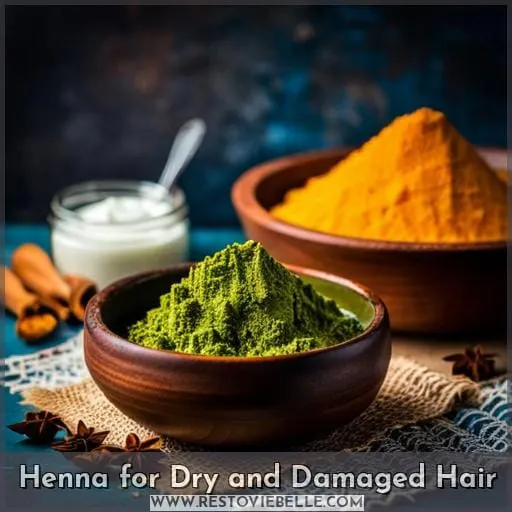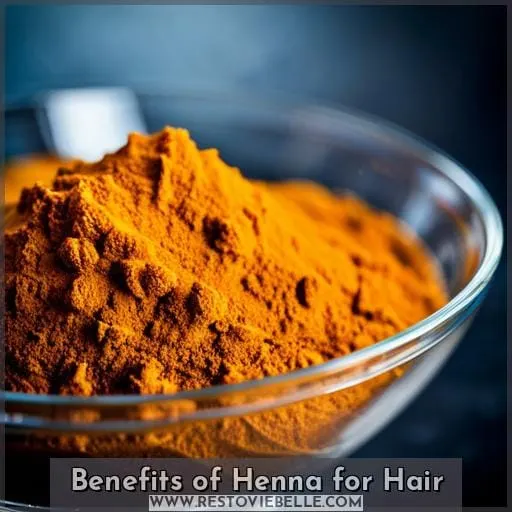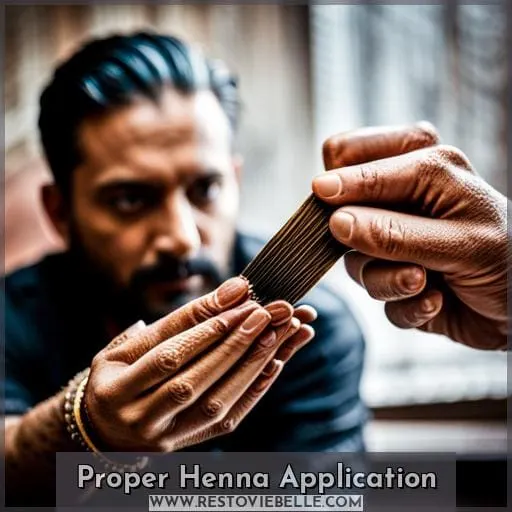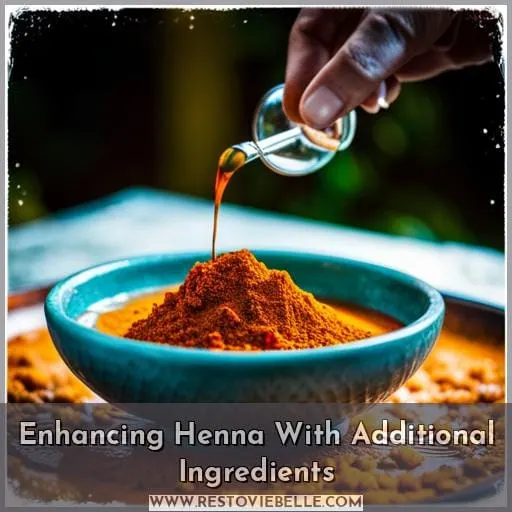This site is supported by our readers. We may earn a commission, at no cost to you, if you purchase through links.
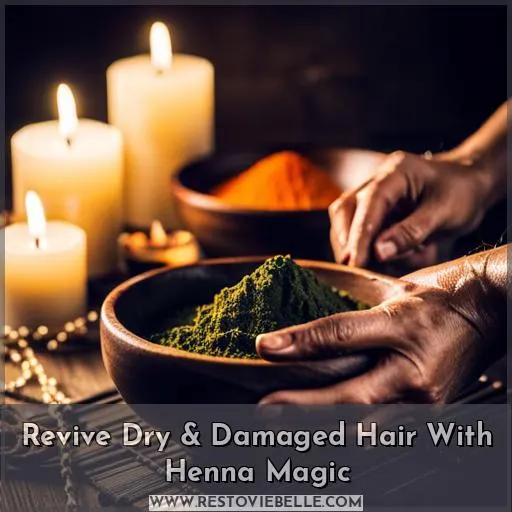 Are you looking for an all-natural alternative to chemical hair dyes? Have a head full of dry and damaged tresses in need of repair? Henna could be the answer. This ancient plant-based dye has been used for centuries to condition, strengthen, and nourish your locks.
Are you looking for an all-natural alternative to chemical hair dyes? Have a head full of dry and damaged tresses in need of repair? Henna could be the answer. This ancient plant-based dye has been used for centuries to condition, strengthen, and nourish your locks.
From controlling sebum production and preventing infection to promoting growth – henna is a great way to revitalize dry or damaged hair! In this article, we’ll explore how mixing henna can restore shine while repairing damage from environmental factors like sun exposure or overstyling.
Learn proper application techniques as well as additional ingredients that may enhance the effects on your scalp and hair health now!
Table Of Contents
Key Takeaways
- Mixing henna with coconut oil or olive oil enhances its deep conditioning effects for dry and damaged hair.
- Regular hydration with henna treatments prevents tannin dryness and improves hair manageability and strength.
- Henna’s antibacterial properties soothe itchy scalps and prevent infections, promoting scalp health.
- Adding lemon juice or coconut oil to henna ensures better penetration and enhances its effects for dry and damaged hair.
Henna for Dry and Damaged Hair
You can use henna to naturally protect and repair your hair from damage caused by pollution, heat treatments, and chemicals. Henna’s natural coloring pigments provide a nourishing solution that revitalizes dry or damaged hair while promoting growth.
It has antibacterial properties that help control sebum production on the scalp while also soothing itchy scalps.
With its ability to act as a UV filter for your locks, you won’t have to worry about further damaging your tresses with sun exposure either! For best results, mix quality BAQ henna powder with ingredients like lemon juice or coconut oil before application.
This will ensure better penetration of the mixture into the shafts of each strand for maximum conditioning effects.
To get in-depth knowledge about herbal haircare options such as henna without added chemicals is key when treating dryness due to its tannins content. Add moisturizing elements like yogurt or olive oil for extra hydration after rinsing out the mask with cool water.
Benefits of Henna for Hair
Are you looking for a natural remedy to treat dry and damaged hair? Henna is an excellent choice, offering many benefits such as controlling sebum production, preventing infection on the scalp, soothing itchy scalps, nourishing locks of hair, and promoting growth.
Controls Sebum
By controlling sebum production, henna can help keep your scalp healthy and prevent greasiness. The regulating oil production benefits of this natural hair care remedy are ideal for damaged hair with an imbalance in texture due to excessive sebum.
Henna’s ability to balance the scalp’s pH levels helps reduce inflammation and dryness that often lead to dandruff or other issues on the scalp. It also works wonders in helping moisturize strands while reducing frizz caused by too much oil build-up at the roots.
A regular henna treatment is a great way to restore health and shine back into dried out locks without stripping them of their essential oils!
Prevents Infection
Discover how henna’s antibacterial properties can help protect your scalp and hair from infection. Its natural defense boosts immunity, soothes irritation, prevents infections, and supports healing. Mix a henna recipe that suits damaged hair to get the full benefits of its soothing properties for restoring health to strands while protecting against future damage.
Henna is an all-natural solution to many common causes of scalp infections like dandruff or dryness due to heated styling tools or chemical treatments. Use it regularly for optimal protection! With regular use of this potent remedy, you’ll never have to worry about infection again.
Soothes Scalp
The soothing effects of henna on your scalp can be likened to a cool, refreshing breeze on a hot summer day. Scalp massage benefits help boost circulation and nourish the strands with natural anti-inflammatory compounds found in herbal infusions.
Henna’s proven itch relief techniques make it ideal for those looking to soothe irritations and moisturize their hair without the use of harsh chemicals or products that may cause further damage. The natural remedy penetrates deeply into each strand, helping to strengthen and protect against future breakage while restoring strength, shine, and texture.
With regular application every 4-6 weeks, you’ll notice increased hair elasticity and improved manageability from root to tip!
Nourishes Locks
Indulge your locks with a natural remedy like henna to nourish, strengthen, and protect them. Revitalizing techniques, such as an herbal infusion of henna, can help promote moisture retention for hair health.
Henna’s restorative properties are ideal for repairing damaged cuticles while conditioning and strengthening hair follicles. Achieving the perfect paste consistency is key when mixing henna for dry and damaged hair treatment to ensure it coats each strand evenly during application rituals.
Hair repair through this unique natural therapy offers a wealth of benefits. It can restore shine and improve elasticity in strands, making it a great option over traditional chemical treatments!
Promotes Growth
By using henna, you can naturally stimulate hair follicles and promote growth. Studies show that it increases new hair growth by up to 80%. Stimulating circulation with scalp massage techniques is key for effective nutrient absorption.
A herbal tea rinse or a special henna hair mask helps in further nourishing your locks.
Henna is perfect for all types of damaged hair concerns – from greying and thinning to split ends. It provides much-needed moisture and protection from heat treatments and chemical-laden products.
How to Make Henna Hair Mask
Creating a luscious and nourishing henna hair mask is an ideal way to deeply condition dry, damaged strands. With the right mix of ingredients like oil, lemon juice, or yogurt in your henna mixture, this natural remedy can help reduce dandruff and hair fall while promoting healthier growth.
Deep Conditioning Mask
Give your hair a nourishing boost with an all-natural deep conditioning mask made from henna. Start by infusing tea or water into the henna powder and stir in oil, yogurt, or lemon juice to achieve the desired paste consistency.
Then apply it using specific techniques for maximum overnight benefits. You can further enhance your treatment with herbal additions like amla and hibiscus powders for smoother locks.
Using Oil in Henna Mix
Adding a few drops of oil to your henna mix can give you soft, nourished locks in no time! Coconut or olive oil is best for incorporation.
The benefits explored include added moisture and hydration, as well as promoting scalp health with anti-inflammatory properties.
Here are some application tips: mix oils into the paste before applying it onto dry hair from roots to ends. Leave it on for two hours, then rinse off with cool water – avoid shampooing until 48 hours later.
Afterward, your hair will feel softer and conditioned, without being greasy. It’s the perfect natural treatment routine that won’t cause long-term damage!
Mask for Dandruff and Hair Fall
Treat dandruff and hair fall with a henna mask by combining the powder with water, yogurt, lemon juice, or coconut oil. Strengthening the roots can help reduce dandruff, and adding yogurt to the mixture provides an infusion of lactic acid.
Lemon juice nourishes the scalp and combats hair fall due to its Vitamin C content. Coconut oil helps create a thick paste that conditions and strengthens dry or damaged hair, while also providing glossiness and shine.
- Reduce dandruff by strengthening the roots.
- Combat hair fall by using lemon juice‘s Vitamin C content.
- Make a consistent paste using coconut oil.
- Use only quality Body Art Quality (BAQ) Henna.
- This natural alternative is a safe option compared to chemical-based products.
Proper Henna Application
Making a henna hair mask for dry and damaged hair is simple. Begin by measuring out Body Art Quality (BAQ) henna powder, then mix it with lemon juice or apple cider vinegar to enhance the penetration of the conditioning ingredients.
Coconut milk or olive oil can be added as additional moisturizing agents before application, from roots to ends, leaving it on for a minimum of two hours before rinsing off with warm water.
Recipe and Ingredients
Try creating a deep conditioning henna hair mask by combining the right ingredients to nourish and restore your dry, damaged locks. For best results, select quality BAQ Henna or Lawsonia Inermis for the infusion base.
Use oil instead of water for consistency and add hydrating oils like coconut or olive oil to make mixing easier. Experiment with custom blends depending on your individual needs. Try adding yogurt for an anti-dandruff blend or lemon juice to increase penetration into hair follicles.
When applying this natural treatment, be sure to cover from roots to ends and leave it on for two hours before rinsing with lukewarm water.
Application Process
Apply the henna mixture to your hair from roots to ends, then cover it with a shower cap. Take time for preparation steps before application; the right consistency and quality of henna paste are important.
After applying, leave it on for two hours or more and rinse it off with lukewarm water. Troubleshooting tips include using alternative methods like oil-based mixtures if dealing with frizz or dryness in damaged hair.
Aftercare
After you’ve applied the henna mixture to your hair, make sure to rinse with lukewarm or cold water, like a soothing balm. Dealing with residue can easily be done using an oil-based moisturizing technique, such as coconut and olive oils.
To further hydrate the scalp post-application, try adding yogurt or almond milk for additional nourishment and moisture retention. Post-care is essential for henna treatments to effectively work on dry and damaged hair.
This is especially important when using BAQ Henna, which may require more frequent deep conditioning sessions than other types of henna paste consistency mixes.
After each session, be sure to properly hydrate your strands since oil can replace some of the water from traditional recipes used to prepare a treatment specifically designed to repair dryness caused by external aggressors, such as pollution or heat damage.
Henna’s Effects on Scalp and Hair
Using henna as a natural alternative to protect your scalp and hair from damage, repair existing damage, and prevent further breakage is an excellent choice. Henna’s natural UV filter helps protect against environmental pollutants, while its antibacterial properties help keep your scalp healthy.
With regular use of a quality henna product that best suits you, you can enjoy the many benefits it provides for softer, shinier locks.
UV Protection
Shield your hair from sun damage by adding henna to your routine—it serves as a natural UV filter! Henna has protective effects, sunscreen properties, and numerous hair care benefits. It shields the scalp and strands against UV radiation while promoting conditioning and strengthening of the locks.
When preparing a henna paste for use on dry or damaged hair, adjust the consistency based on the desired level of protection. Thicker mixtures offer more shielding power. Natural treatments like this are great solutions for nourishing tresses without harsh chemicals that can worsen existing issues such as breakage or split ends.
Leave the henna paste in longer if extra reinforcement is necessary. It’s an effective way to prevent sun damage all year round!
Repair and Damage Prevention
Combat dryness and damage with henna’s natural reparative benefits! A hair mask made with henna can strengthen, reduce breakage, add elasticity to the hair shafts, and repair damaged cuticles. Natural remedies like lemon juice or coconut oil can be added to enhance conditioning.
Consistent use of a nourishing henna-based hair care regimen will help restore moisture in your locks while protecting them from pollutants and harsh chemicals found in everyday products. Finally, proper application technique is key to maximizing results when using henna as a natural conditioner or deep treatment mask for dry and damaged tresses.
Enhancing Henna With Additional Ingredients
Mixing henna for dry and damaged hair can be enhanced with additional ingredients such as nutmeg powder, lavender essential oil, or herbal hair oil. These natural substances are known to treat scalp issues like dandruff and improve the shine of your hair while also strengthening it from within.
Nutmeg Powder
Adding nutmeg powder to your henna mixture can help nourish and protect your scalp from damage. Its antimicrobial, antiseptic, and anti-inflammatory properties, combined with its antioxidant content, make it a great addition to promote hair health.
For best results, mix one teaspoon of nutmeg powder into the henna paste before application on damaged hair. Nutmeg’s infusion helps soothe an itchy scalp while providing essential vitamins for stronger strands that are less prone to breakage or dryness.
As part of a synergistic combination with Lawsonia Inermis (henna), this natural remedy provides an efficient treatment for promoting healthier locks without long-term damage due to chemicals or other harsh treatments.
Try adding nutmeg powder in your next henna mask today!
Lavender Essential Oil
Treat your dry and damaged hair with the healing properties of lavender essential oil in your henna mixture. Aromatherapy potential is one benefit this oil can bring. Scalp massage helps to stimulate blood circulation when mixing it with a carrier oil like almond or jojoba.
Lavender’s stress relief properties can help you relax during application as its natural conditioning benefits nourish and hydrate the scalp for healthier hair growth. Try adding a few drops into your henna mask mix for an extra boost of calming effects that will soothe any concerns regarding damage due to heat styling or chemical treatments.
Herbal Hair Oil
Invigorate your hair with a herbal oil blend to nourish and protect. Start by mixing Body Art Quality henna powder, lemon juice, coconut oil, or olive oil into a paste. Then apply the mixture gently onto the scalp and massage for five minutes in circular movements to increase circulation.
Use heated oils such as castor or almond for optimal absorption of nutrients into the hair shafts while providing deep conditioning benefits from within! Lastly, leave it on overnight before washing off with lukewarm water for the best results.
Enjoy softer locks that are boosted in strength and shine without any damage caused due to chemicals!
Addressing Post-Henna Dryness
After applying henna, it is important to understand the temporary tannin dryness that you may experience. To avoid this, make sure to use quality henna without any added chemicals and be sure to hydrate your hair regularly.
It is also essential to choose a recipe for a henna mixture specifically designed for damaged hair.
Temporary Tannin Dryness
After using henna for hair care, you may experience temporary dryness due to the tannins in the mixture. To minimize this effect, opt for a higher quality BAQ henna and use moisturizing ingredients like coconut oil or olive oil when mixing.
Additionally, avoid shampooing directly after applying henna and rinse with lukewarm or cold water instead. Regular hydration is key to avoiding excessive dryness post-henna application; consider incorporating weekly deep conditioning treatments into your routine as well.
Importance of Quality Henna
Using quality henna, such as Body Art Quality (BAQ) or Lawsonia Inermis, is essential for achieving desired results and avoiding damage.
- Proper selection of BAQ Henna ensures the best results with minimal risk of allergic reactions.
- Techniques like mixing lemon juice and coconut oil will provide extra conditioning benefits while aiding in paste consistency.
- Variations in color result from application techniques; however, users should always prioritize safety when using any product containing natural dyes.
Regular Hydration
Nourish your hair and give it the hydration it needs with regular conditioning treatments. Use henna for added moisture, but always choose Body Art Quality (BAQ) or Lawsonia Inermis to avoid chemicals.
Enhance your moisturizing techniques with coconut oil or olive oil in a thick paste-like mixture that you leave on for two hours before rinsing out with lukewarm water.
Consider creating a deep conditioning mask by adding yogurt, lemon juice, and other ingredients to the mix. These ingredients can help address dandruff and dryness caused by pollution or heat styling tools.
Make sure to include weekly hydrating masks in your routine. These masks replenish essential oils while offering natural protection from UV rays without causing long-term damage!
Variety of Henna Hair Masks
From gray hair to strong, silky, and shiny tresses, henna is an ideal natural remedy for a variety of needs. Mixing the perfect henna-based mask tailored to your specific hair issues requires precise instructions and in-depth botanical knowledge.
Gray Hair
If you’re looking to cover gray hairs, henna is an effective natural remedy. Its pigments can provide long-lasting coverage of up to six weeks with just one application!
To create a nourishing hair mask for gray transformation, mix henna powder with water or tea and add coconut oil.
For maintenance, use natural conditioners like olive oil instead of water when creating the paste. Gray hair needs extra TLC, so be sure not to shampoo post-henna and incorporate frequent hydrating treatments into your routine.
With proper care and regular applications of this simple yet powerful treatment, you’ll achieve smoothness and shine that will last!
Silky and Shiny Hair
For silky and shiny hair, try a henna mask that’s packed with nourishing ingredients. Mix ground Lawsonia Inermis powder with coconut oil and olive oil to create the perfect paste consistency for your hair.
Apply it from roots to ends, leave it on for two hours or more, then rinse off in lukewarm water.
The combination of oils helps revive luster while the henna works its magic at softening your tresses! Achieve glossy mane secrets by regularly using this natural remedy; luminous tresses are within reach!
Avoid shampooing immediately after use as this prevents silkiness revival – allow 48 hours before cleansing again.
Strong Hair
To strengthen your hair, try a henna mask with ingredients like coconut oil or yogurt. This natural treatment will nourish and condition the strands while also providing protein to repair breakage.
Mix henna powder with water and add an oil of choice for extra moisture. Make sure the paste consistency is thick enough to adhere onto the hair without dripping off.
Apply from roots to ends, cover with a shower cap or scarf for two hours, and then wash it out using lukewarm water only – no shampoo necessary!
Allow your locks some time under this protective layer as regular use can help maintain strong, healthy hair over time.
How Henna Fixes Damaged Hair
You can use henna to effectively repair and protect your dry and damaged hair. Henna prevents breakage, heals damage, deeply conditions, balances the pH level of your scalp, and requires specific ingredients for an effective mixture.
Prevents Breakage
By using a henna hair mask, you can prevent breakage and protect your tresses from heat treatments and pollution. A deep conditioning henna hair mask made with coconut oil will help repair strands while strengthening roots for revitalized locks.
The consistency of the paste is important as well. It should be thick enough to coat each strand, penetrating the cuticles without dripping off. This helps ensure that every part of your hair shaft receives full coverage and protection against damage-causing agents like UV rays or chemicals found in pollution.
Additionally, regular application will increase resilience. Even after styling with heated tools or harsh products, breakage is minimized significantly, leaving you with healthier-looking locks!
Heals Damage
Revitalize your hair and restore its natural luster with the healing power of henna. To repair dry, damaged locks, mix BAQ henna powder with a liquid like lemon juice to create a paste. Add additional ingredients such as coconut oil or olive oil for extra conditioning and penetration into the scalp’s hair follicles.
Leave on for 2 hours or more before rinsing off with cool water to avoid aggravating pre-existing damage.
Deep Conditioning
Indulge your hair with a deep conditioning henna mask to make it feel luxuriously soft and healthy. Mix up a paste of henna, coconut oil, water, or tea for an overnight application that will give you improved manageability and strength.
To get the most out of this natural hair conditioner, use the tea infusion method to ensure maximum penetration into the scalp.
The benefits of this deep conditioning henna mask are numerous. It strengthens follicles from root to tip while providing protection against pollution damage – all without harsh chemicals. So, don’t be afraid to go all in! With regular applications, your dry and damaged tresses will become more manageable than ever before, giving you glossy results with minimal effort.
PH Balance
Rebalance your hair’s pH levels with a henna mask to help restore moisture and shine. Hair is naturally acidic, but an overly alkaline scalp can lead to dryness and damage. Henna helps regulate the acidity of both the scalp and cuticles, enhancing the penetration of its strengthening components into each strand.
To ensure maximum benefit from this deep conditioning process, opt for an acidic rinse post-treatment instead of shampooing too soon or using hot water when rinsing off the henna mask.
Required Ingredients
To effectively use henna to nourish your hair, you’ll need a few key ingredients like lemon juice, coconut oil, and yogurt. When mixing henna for conditioning and penetration, try adding other natural elements such as olive oil or honey to create the perfect paste consistency.
For a deep conditioning mask, mix water with body art quality (BAQ) henna powder.
Always follow safety guidelines regarding proper application and aftercare. Avoid frequent usage that can lead to dryness post-henna use.
Conclusion
Henna proves to be a wonderful remedy for dry and damaged hair, providing a natural alternative to chemical-based treatments. When used correctly, it can nourish, repair, and restore the locks to their former glory.
Its antibacterial properties reduce sebum production, prevent infection, and soothe itchy scalps. It also strengthens the hair follicles, promotes growth, and protects hair from UV damage.
With the right ingredients, a henna hair mask can be custom-tailored to address specific hair concerns. But even in its simplest form, henna can be a powerful agent for hair repair. So, whether you’re looking to revive dull, dry, and damaged tresses or simply want to give your hair a boost, henna is an effective and natural way to do it.
